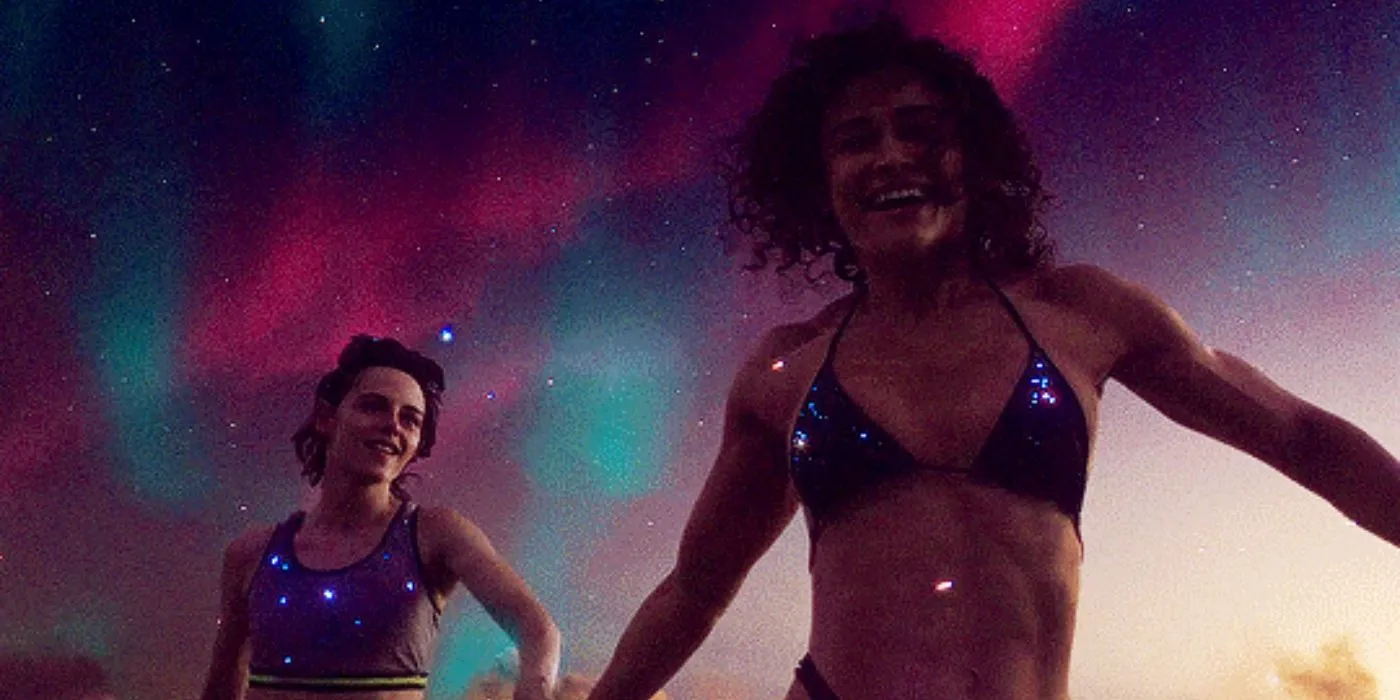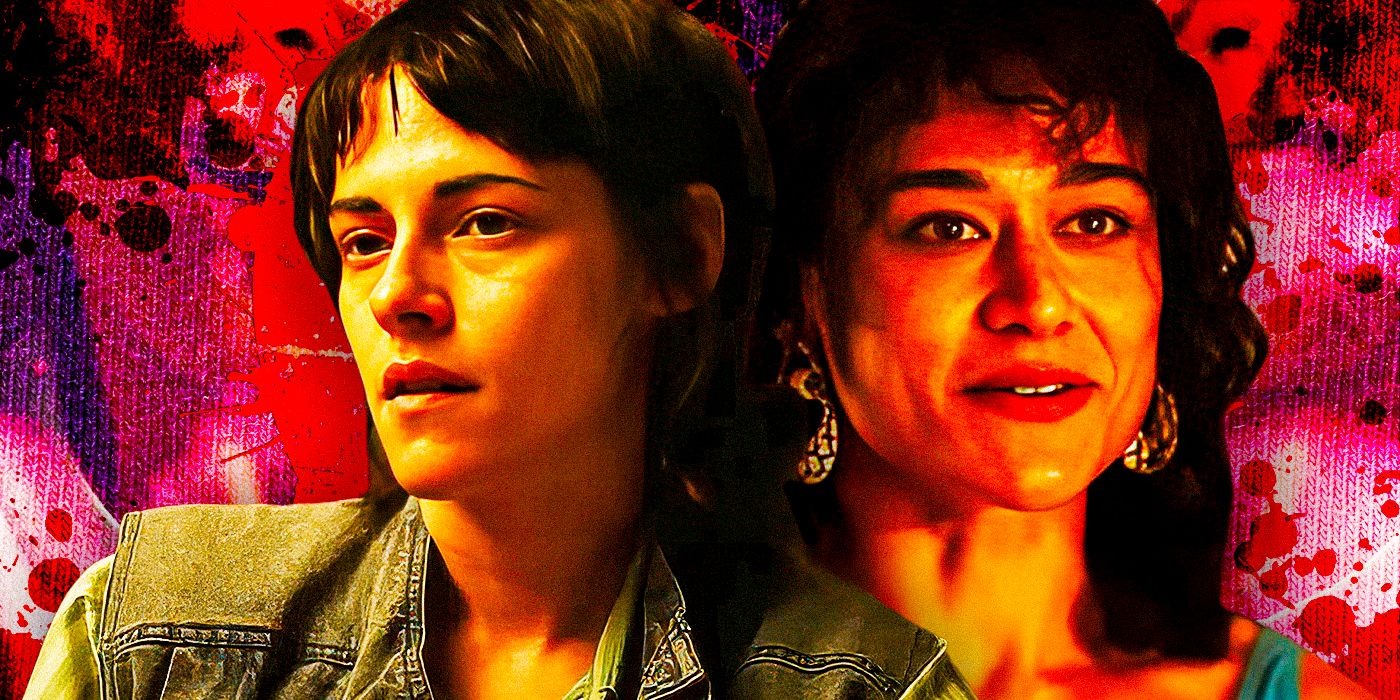A24’s unusual crime thriller Love Lies Bleeding leans heavily on symbolic elements and blurs the difference between a dream and real life, making its confusing final part hard to fully understand. Kristen Stewart, returning to thriller roles, stars in this intense story filled with obsession, family tension, and brutal events.
All told through a mix of raw reality and the glowing, surreal atmosphere of the 1980s American Southwest. Two women, Lou (Stewart) and Jackie (Katy O’Brian), fall for each other, but their bond begins to face trouble as a chain of violent incidents—encouraged by Lou’s dangerous father (Ed Harris)—starts to take over.

There appears to be genuine affection at the center of Love Lies Bleeding, but once things spiral and deaths occur, the audience begins to wonder if any character has good intentions at all. Director Rose Glass, known for Saint Maud, makes use of heavy symbolism and does not hesitate to twist how the audience sees reality.
The final portion of the film brings in even more confusion between what is imagined and what is true, leaving space for viewers to decide what they think happened.
What Happens In Love Lies Bleeding’s Ending
Lou And Jackie Get To Ride Off Into The Sunrise
Rather than keeping quiet or hiding, Lou goes straight to her father’s house after escaping from the officer sent to eliminate her, determined to free Jackie and confront him. The two lovers reconnect before separating—Jackie makes her way out with the FBI closing in, while Lou goes after her father.
But her plan is disrupted as Lou Sr. shoots her in the leg before she can act. He then begins tormenting her by pressing on the wound, denying her accusations that he murdered her mother and instead blaming their shared criminal past for the woman’s departure.
Love Lies Bleeding was first shown at the Sundance Film Festival in January 2024 during the Midnight section, which usually features horror or experimental films. Just when it seems Lou’s life will end, Jackie changes similarly to earlier moments—her body starts expanding rapidly.
But this time, she doesn’t stop. She grows until she becomes about 50 feet tall, strong enough to lift Lou Sr. off his daughter and pin him down. Lou has a moment where she considers ending his life but walks away instead, letting the authorities handle him.
Dressed in glittering costumes, the two women—both now gigantic—run off through the clouds together. Later that night, they drive through the desert in Lou’s truck. Lou eventually realizes that Daisy, who she thought was dead, is alive and moving in the truck bed.
Without waking Jackie, Lou quietly strangles Daisy and struggles to drag her body out to the desert. That final moment is used for a dark bit of humor, as Lou’s lack of physical strength stands out beside Jackie’s earlier transformation.
How Love Lies Bleeding Director Rose Glass Explains The Ending
The Surreal Conclusion Deals With Strength, Love, And The Intersection Between The Two
Rose Glass shared her thoughts about the more dreamlike parts of the film’s ending in an interview with Inverse.
She pointed out the scene where Jackie and Lou flee as towering figures, explaining that the emotions felt during deep love—like feeling unstoppable or floating—were better expressed that way, even if the approach leaned towards the ridiculous.
According to her, this exaggerated finish was necessary after all that had come before. Glass mentioned that they wrote several versions of the final confrontation that stayed rooted in reality, but none of them felt like the right match.
Since hints of body changes had been dropped earlier in the film, they decided to fully commit to that fantasy direction. With everything that happened—multiple brutal deaths and emotional damage—the exaggerated ending acts like a final punch.
Glass treated it as a payoff for the emotional and symbolic growth shown throughout the story. Through its raw and intense storytelling, Love Lies Bleeding tackles themes like what strength truly means, how addiction can take hold, and where the line between love and obsession may lie, using both obvious and hidden messages.
How The Love Lies Bleeding Ending Was Received
Some Critics Didn’t Appreciate The Ambiguity
Rose Glass’s second movie after 2019’s Saint Maud was Love Lies Bleedingconclusion., and it was met with strong critical approval, earning a 94% score on Rotten Tomatoes, just slightly above her debut’s 92%. Even so, like with many stories that leave things uncertain, not every viewer was satisfied with the conclusion.
This isn’t to say the ending was dismissed outright. A good number of critics and fans felt the conclusion made sense with the rest of the story. Some noticed subtle additions in the final act—like Lou returning to smoking—that gave extra layers to the characters’ journeys without shifting the story’s main focus.
These kinds of details helped strengthen the last few scenes, and Glass was praised for including them. Still, some reactions weren’t as warm. A few viewers and critics thought the ending was too puzzling, wishing for something more direct or easier to understand.
But even those who didn’t enjoy the ending admitted it didn’t damage the rest of the film. It was more of a minor complaint within a strong piece of work, showing that Glass made very deliberate choices while building Love Lies Bleeding.
What The Director Said About The Challenges Of The Film’s Ending

Rose Glass Had To Learn Some New Filmmaking Techniques For The Finale
The decision to end Love Lies Bleeding with such an imaginative twist brought new technical demands for Rose Glass. Before this movie, she only had one full-length feature under her belt—Saint Maud, which was much smaller in scope.
Making Jackie appear gigantic on-screen pushed her to learn how to use advanced visual effects. According to what she told IndieWire, it was this CGI-heavy part that felt most intimidating: “It was my first time directing something where actors had to respond to tennis balls on sticks, which looked funny.
We filmed Ed and Kristen reacting while shooting Katy separately on a grey screen and then had to put everything together. It was a nerve-racking experience.” Though it made up only a brief moment in the movie, this attempt at using effects might influence how Glass approaches future projects.
Whether she returns to similar techniques or not, the way she handled it in Love Lies Bleeding adds something fresh to her growing career as a filmmaker.



